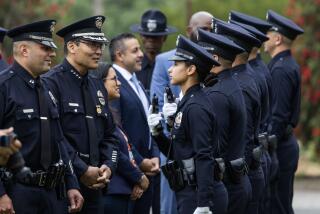There’s Trouble Afoot : Pacoima: The mayor’s proposal to cut police patrols is criticized by business owners who say progress in fighting crime would be lost.
Van Nuys Boulevard through Pacoima is a diverse commercial strip of banks, bars, small markets and offices. Part of an area designated as an “enterprise zone” to stimulate commerce, it’s being promoted as an attractive place to set up shop or come to shop.
But the owners of businesses there say the hustle and bustle of the strip disguises problems that stand in the way of their success:
Drugs are sold on some corners, and buyers sit in alleys in a narcotic daze. Drunks openly pass bottles in empty lots. The boulevard itself divides the turfs of two gangs, and sometimes members of one sullenly stare down rivals from the other across four lanes of traffic.
So it was no surprise last week that Mayor Tom Bradley’s proposal to save money by cutting back on police foot patrols in the area received an icy reception. For more than a year, the Los Angeles Police Department has assigned two officers, day and night, on foot or on bikes, to a beat that stretches along the boulevard from Laurel Canyon Boulevard north to the Pierce Park public housing complex.
The officers have created a presence that the locals don’t want to lose.
“This is not good news,” said John M. Gallarza, manager of TransWorld Bank, which is in the area’s enterprise zone.
Businesses in such state-designated zones receive tax and loan incentives to encourage them to locate there or to remain there and expand.
“The police on the foot beat are involved in enforcement; they are a deterrent and they are presenting a positive image,” Gallarza said. “It is almost like the Police Department is tagging its territory here.”
Bradley’s budget proposal would eliminate 27 officers assigned to foot patrols in the Pierce Park housing complex in Pacoima and in housing projects on the city’s south side. According to the proposal, the officers would be transferred to cars.
Police officials said that if those cuts remain in the final budget, it could wipe out the Pacoima foot patrols.
Although it is described in the budget document as the Pierce Park foot beat, the complex is actually a very small part of the territory where the patrols work, said Capt. Tim McBride, commander of the Foothill Division, which includes Pacoima. The complex has a private security patrol, and the foot beat has evolved to focus mainly on the problems of the nearby Van Nuys Boulevard commercial corridor.
The proposed cutbacks are in response to a projected $183-million shortfall in the fiscal year that begins July 1. In presenting a proposed $3.8-billion budget, the mayor said the city faces its “bleakest financial picture in memory” and he called for many cuts in police and fire services.
This past week, Police Chief Daryl F. Gates decried the cuts, which he said would reduce the department’s staffing by 1,000 officers. He said the cuts would increase response times and make it difficult to fight crime.
Councilman Ernani Bernardi, who represents Pacoima, said he opposes any cutback in police services, including the foot beats. His office recently provided $2,200 for police to buy the bicycles used by officers on the Van Nuys Boulevard beat.
“It’s working in the enterprise zone,” he said. “It’s working wonderfully. We don’t want to lose that. We want to expand it. I think this budget has got its priorities skewed.”
McBride and others said budget-cutters might have zeroed in on the foot beats in the mistaken belief that they primarily engage in community relations activities and could be eliminated without affecting crime fighting. But McBride--and numerous merchants--disagree.
Although the officers interact with people in stores and on sidewalks, they provide a strong enforcement presence as well, McBride said.
The officers routinely handle calls and make arrests in the area, often for crimes that would otherwise go unnoticed or even unreported. Besides the foot beat, there is a lone patrol car assigned to most of Pacoima.
“These aren’t officers out there patting little kids on the head,” McBride said. “These are people handling calls and we can’t afford to cut them.”
Dean Gizzi, one of the foot patrol officers, said the beat helps improve relations between police and the public, with positive results for both.
“People feel more assured because we are right here, not isolated in the car,” he said last week while walking the beat with partner Bill Tatum. “People get to trust you and they start turning you on to things that are happening. We make arrests that way.”
Henry Rose, co-owner of two markets in the area, said having the police on foot or on bikes has had an immediate effect on street drug dealing.
“By their presence on the street, it almost eliminates the sales of narcotics,” Rose said. “But as soon as they leave, the dealers come back. The foot beats are very effective. We need them kept here to maintain the status quo.”
Rose has hired security guards to keep dealers away from his stores, but he admits that there is little they can do when the drug sellers congregate across the street or on public property.
“I can’t cross the street and tell them to move on,” he said. “But the police do.”
Rose said that, as a businessman, he understands the city’s need to balance its budget and cut costs during difficult economic times. But he said the short-term savings of cutting the foot patrol would have long-term consequences.
“We are not looking for favors,” he said. “We just want a crime situation to be eliminated.”
Without the foot and bike patrols, open drinking in the area’s main commercial corridor would increase, predicted Fred Taylor, a leader in business and citizen groups that have worked for several years to gain control of the problem.
“We are just starting to turn the corner,” Taylor said. “It would not have improved without the merchants working together and the foot patrol. I think if you eliminate these foot patrol people, it is going to revert back.”
Taylor, like others, criticized what he believes are budget cuts proposed with little attention paid to the consequences. He said eliminating foot beats would also violate the principal call of the Christopher Commission to bring more community policing to the city.
“It’s the bottom line of what community policing is all about. I think the people in City Hall have to come out to the community and see what’s going on before making a decision like this.”
Gallarza, the bank manager, offered a single story to illustrate the effectiveness of the foot beat and the need to keep the officers in place.
He said that last year, gang members began loitering in the afternoons in front of TransWorld Bank so they could watch their rivals, who gathered each day at a fast-food restaurant across the street. The almost daily event became a problem because bank customers felt intimidated.
After discussing the situation with gang officers and a patrol supervisor, “No Loitering” signs were posted in front of the bank. The signs empowered police to move the gang members along when they gathered. The problem abated and, because of the officers on patrol, has not returned, Gallarza said.
“Gang members aren’t going to hang around here when the officers are right there in sight,” he said.
More to Read
Sign up for Essential California
The most important California stories and recommendations in your inbox every morning.
You may occasionally receive promotional content from the Los Angeles Times.










